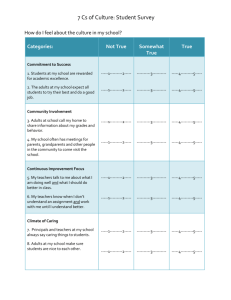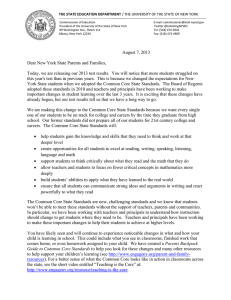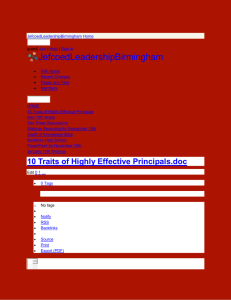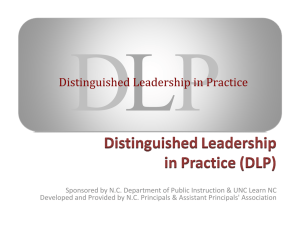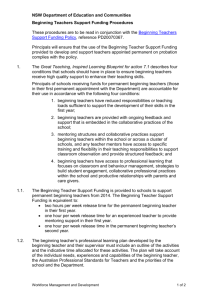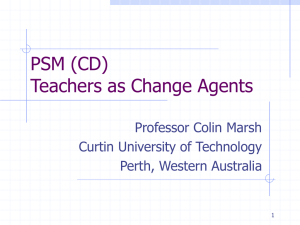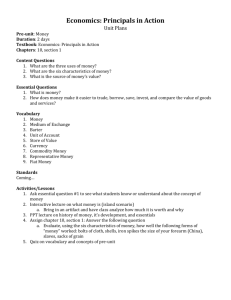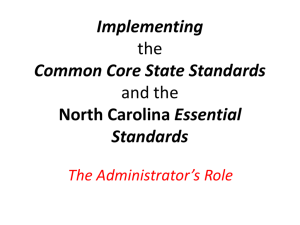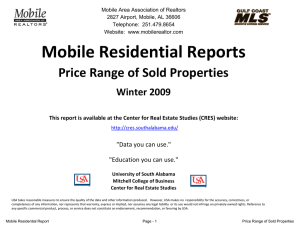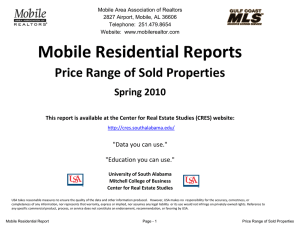COLLABORATIVE CONFERENCE ON STUDENT ACHIEVEMENT
advertisement
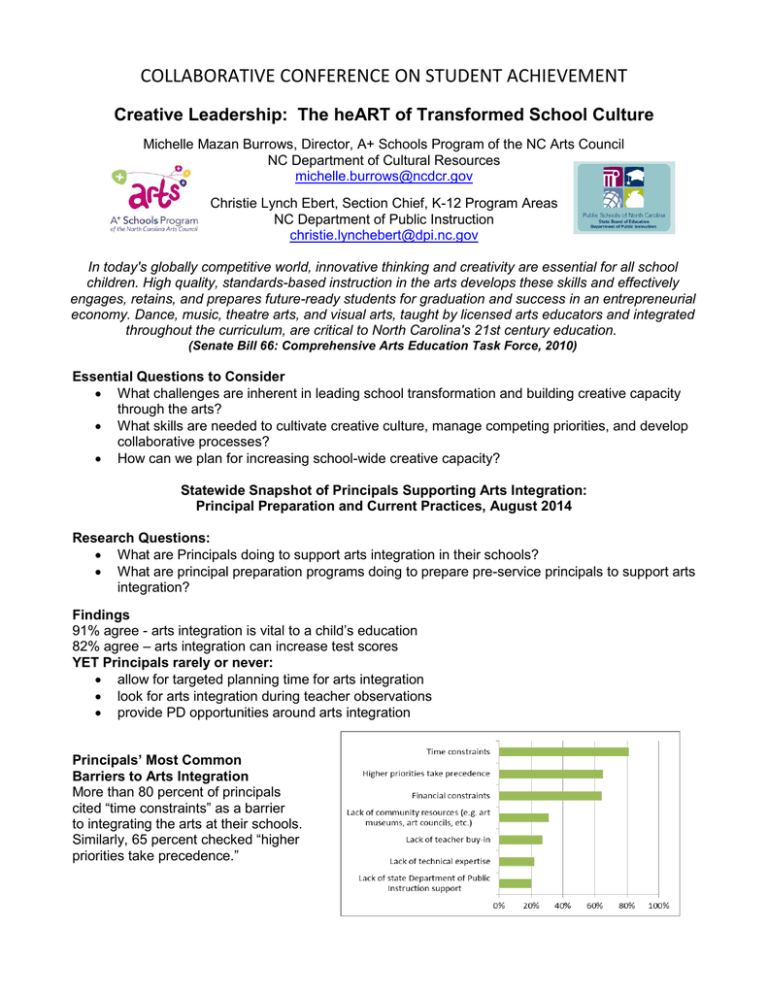
COLLABORATIVE CONFERENCE ON STUDENT ACHIEVEMENT Creative Leadership: The heART of Transformed School Culture Michelle Mazan Burrows, Director, A+ Schools Program of the NC Arts Council NC Department of Cultural Resources michelle.burrows@ncdcr.gov Christie Lynch Ebert, Section Chief, K-12 Program Areas NC Department of Public Instruction christie.lynchebert@dpi.nc.gov In today's globally competitive world, innovative thinking and creativity are essential for all school children. High quality, standards-based instruction in the arts develops these skills and effectively engages, retains, and prepares future-ready students for graduation and success in an entrepreneurial economy. Dance, music, theatre arts, and visual arts, taught by licensed arts educators and integrated throughout the curriculum, are critical to North Carolina's 21st century education.000 (Senate Bill 66: Comprehensive Arts Education Task Force, 2010) Essential Questions to Consider What challenges are inherent in leading school transformation and building creative capacity through the arts? What skills are needed to cultivate creative culture, manage competing priorities, and develop collaborative processes? How can we plan for increasing school-wide creative capacity? Statewide Snapshot of Principals Supporting Arts Integration: Principal Preparation and Current Practices, August 2014 Research Questions: What are Principals doing to support arts integration in their schools? What are principal preparation programs doing to prepare pre-service principals to support arts integration? Findings 91% agree - arts integration is vital to a child’s education 82% agree – arts integration can increase test scores YET Principals rarely or never: allow for targeted planning time for arts integration look for arts integration during teacher observations provide PD opportunities around arts integration Principals’ Most Common Barriers to Arts Integration More than 80 percent of principals cited “time constraints” as a barrier to integrating the arts at their schools. Similarly, 65 percent checked “higher priorities take precedence.” NC Work on Comprehensive Arts Education: Key Details 1985 Basic 2008 Joint 2009 S66 & 2010 S66 2011-12 Education Select H149 Arts Ed H758 Arts Ed TaskForce Commission Program 1985 Basic Committee on Arts Education Education Program The S66 Task Force recognizes a Comprehensive Arts Education as: • Arts Education (arts as core, academic subjects) • Arts Integration (arts as a catalyst for learning across the curriculum) • Arts Exposure (exposure to arts experiences) General Statute 115-C-296 In June 2012, Senate Bill 724: An Act to Implement Various Education Reforms (S724) was signed into North Carolina law. This law requires teacher preparation programs to ensure that pre-service elementary teachers are prepared to “integrate the arts across the curriculum.” This wide-scale legislation directs the State Board of Education to work with the Board of Governors of the University of North Carolina and the State Board of Community Colleges to ensure that programs of study for pre-service and lateral entry teachers remain current and reflect a rigorous course of study that is aligned to State and national standards. The law addresses teacher preparation across many areas, including adequate coursework and requisite knowledge in scientifically based reading and mathematics instruction, knowledge of formative and summative assessments and technology-based assessment systems, and preparation to integrate the arts across all areas of learning. More recent legislation, including House Bill 23 (which adds a digital literacy component) and Senate Bill 168 (which provides clarifying language) continue to reinforce the General Statute 115C-296 arts integration legislation. How familiar are you with the state law requiring teacher preparation programs to provide pre-service elementary teachers with tools to integrate the arts across the curriculum? 30% 20% 10% 0% Very Unfamiliar Somewhat Unfamiliar Neither familiar nor Somewhat Familiar unfamiliar Very Familiar Principals’ Familiarity with Law Requiring Arts Integration in Teacher Preparation RESOURCES FOR FURTHER RESEARCH The A+ Schools Program: The A+ Schools Program is the largest, longest running, most successful arts-based whole-school reform effort in the nation. Since 1995, A+ Schools has been using the arts as a catalyst for creating connections and making school engaging, meaningful and enjoyable places to teach and learn. A+ Website: http://aplus-schools.ncdcr.gov A+ Facebook Page: https://www.facebook.com/aplusnc A+ on Twitter: @AplusSchoolsNC Arts Education Wikispace at NC DPI: A resource for arts educators, administrators, institutions of higher education, and other interested parties. It contains links to standards, instructional tools, professional development, and other resources related to implementing the NC Arts Education Essential Standards. http://ances.ncdpi.wikispaces.net/Comprehensive+Arts+Ed+Plan Arts Education Partnership: AEP serves as a national hub for critical information and communication about current and emerging arts education policies, issues, and activities at the national, state, and local levels. http://www.aep-arts.org/ Arts Ed Search: Arts Education Partnership’s online clearinghouse that collects and summarizes high quality research studies on the impacts of arts education and analyzes their implications for educational policy and practice. ArtsEDSearch Crayola’s Champion Creatively Alive Children: This series will help you implement arts-infused education in your school. The complete program includes 7 videos and guides, along with a supplemental introductory leadership guide, and additional resources to help you facilitate workshops and arts-infused education advocacy meetings. http://www.crayola.com/for-educators/ccac-landing/free-professional-resources.aspx The Partnership for 21st Century Skills (P21): A coalition created to bring together the business community, education leaders, and policymakers to position 21st century readiness at the center of US K-12 education and to kick-start a national conversation on the importance of 21st century skills for all students. http://www.p21.org President's Committee on the Arts and the Humanities: The President’s Committee believes that the arts and humanities should be part of the education of every child in America. The power of the arts and humanities to foster creativity in developing minds, to engage and motivate students in school and to prepare all children for productive futures is essential for the future of nation’s cultural and economic life. The PCAH release a landmark arts in education study in May, 2014. Reinvesting in Arts Education: Winning America's Future Through Creative Schools
